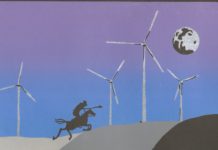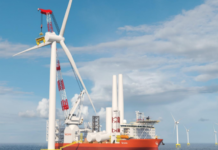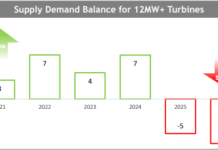Doug Young
In a quirk of timing, 2 completely unrelated rulings are boosting the outlook for Chinese new energy firms from the wind and solar sectors in their complex relationship with the US. The 2 cases are quite different, but each reflects the wariness Washington feels towards these Chinese firms due to their government ties. In the bigger of the 2 cases, a World Trade Organization panel has ruled that US anti-dumping tariffs against Chinese solar panel makers violate WTO rules. In the second case, a US judge’s ruling has given a boost to a Chinese firm that planned to build a wind farm in the state of Oregon, only to get vetoed by Washington over national security concerns.
Neither of these rulings is the end of the story, and it’s still quite possible that Washington could prevail in one or both cases. But the WTO ruling in the solar case could be a tough one for Washington to fight, for reasons that I’ll explain shortly. That could be good news for the entire solar panel sector, as it could force Washington to seek a negotiated settlement in the matter. Such a deal would benefit nearly everyone by maintaining strong global competition, which is a critical element to foster rapid industry development.
All that said, let’s start with a look at the WTO ruling, which was part of a broader series of decisions critical of Washington’s anti-dumping duties. (English article) Washington had argued that Chinese solar panel makers received unfair government subsidies in a number of ways, from subsidized use of government land, to cheap loans from state-run banks, and tax incentives. The US conducted its own investigation 2 years ago, which ended with its decision to impose punitive tariffs against the Chinese firm.
The WTO’s ruling doesn’t dispute Washington’s premise of unfair state subsidies, but rather finds fault with part of the process. Put simply, the WTO’s rules say countries can only impose such anti-dumping penalties if they can prove the guilty companies are wholly or at least partly state owned. That’s a bit problematic in this instance, since many of China’s biggest solar panel makers started out as venture-backed private companies that are now big publicly-traded firms.
In my view the WTO ruling seems based on a technicality, since China clearly subsidizes all domestic solar panel makers due to Beijing’s decision to aggressively promote the industry. But rules are rules, and Washington and everyone else needs to respect the WTO’s guidelines. Washington could still try to prove that private Chinese panel makers like Yingli (NYSE: YGE) and Canadian Solar (Nasdaq: CSIQ) are somehow partly state-owned; but I’m hopeful that maybe the Obama administration will use this moment to re-examine its stance and try to seek a negotiated settlement in the matter.
Meantime on the wind front, a US judge has ruled the Obama administration wasn’t transparent enough when it cited national security concerns as its reason for vetoing a planned wind farm being built by construction equipment maker Sany Heavy (Shanghai: 600031). (English article) This particular case dates back nearly 2 years ago, and reverses a previous ruling by a lower court that had sided with the Obama administration.
In this latest ruling, the judge said the Obama administration was too secretive about its reasons for vetoing the plan, which denied Sany the right to defend itself or seek modifications that might placate the government. Previous reports had speculated that Washington was worried about spying, since the wind farm’s location was near a defense plant making high-tech drone aircraft. I would agree with the judge in this matter, and say that Washington needs to provide at least some of the evidence behind its decision that is likely to cost Sany millions of dollars in lost investment.
Bottom line: A WTO ruling against US anti-dumping tariffs on Chinese solar panels could force Washington to re-think its stance in the matter and seek a negotiated settlement.
Doug Young has lived and worked in China for 15 years, much of that as a journalist for Reuters writing about Chinese companies. He currently lives in Shanghai where he teaches financial journalism at Fudan University. He writes daily on his blog, Young´s China Business Blog, commenting on the latest developments at Chinese companies listed in the US, China and Hong Kong. He is also author of a new book about the media in China, The Party Line: How The Media Dictates Public Opinion in Modern China.







